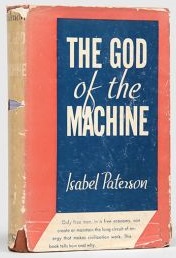 First edition | |
| Author | Isabel Paterson |
|---|---|
| Subject | Individualism |
| Publisher | G. P. Putnam's Sons |
Publication date | 1943 |
| ISBN | 978-1412815833 |
The God of the Machine is a book written by Isabel Paterson and originally published in January 1943 in the United States by G. P. Putnam's Sons. [1] At the time of its release, it was considered a cornerstone to the philosophy of individualism. [2] Her biographer, Stephen D. Cox, in 2004 described Paterson as the "earliest progenitor of libertarianism as we know it today". [3]
Contents
The book has been published several times: by G.P. Putnam's Sons in 1943, by Muriel Hall in 1964, [4] by Transaction Publishers in 1993, [5] and by Routledge in 2017. [6]